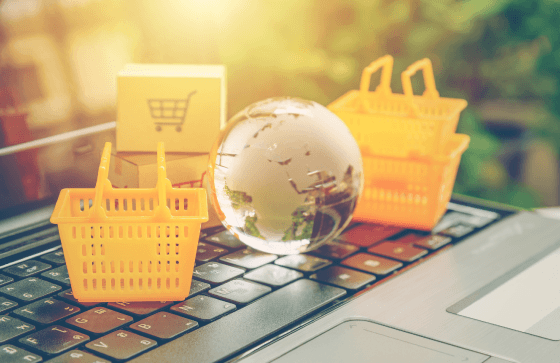B2B E-Commerce Marketplaces - Diversifying International Payment Options
Statista¹ estimates that nearly 1.2 trillion USD worth of products and services will be sold via B2B e-commerce websites by the end of 2021. According to Digital Commerce 360, B2B marketplaces generated $680 billion in 2018, and they expect revenues to increase to $3.6 trillion by 2024. To put it in context, that is about twice the value of Canada’s projected GDP for 2021.
Old fashioned payment methods like cheques simply don’t work for the transaction volumes and models which take place on B2B eCommerce marketplaces. Online international money transfer is far better suited.
There is clearly a great deal of opportunity ahead for B2B distributors, manufacturers, and online service providers in niches like fintech. They simply have to determine whether the best way forward would be to operate their own marketplace as a host, or participate in other existing and emerging marketplaces.
Unlike B2C transactions, many B2B orders are often delivered in multiple incremental shipments instead of all at once. For companies buying products from international suppliers, payments for shipped goods can be scheduled in advance, in parallel to the shipping schedule.
Operating a B2B Marketplace
Merritt Hummer, a partner at Bain Capital Ventures recently wrote a TechCrunch² article declaring B2B marketplaces the next billion-dollar startups. The article acknowledges that even though the majority of B2B payments are still made by cheques, that online payment services from companies like MTFX are quickly gaining ground. Cross-border online money transfer transactions clear faster than cheques, and they are subject to stronger controls to prevent fraud and money laundering.
According to the Digital Commerce 360 survey referenced above, 22 of 201 distributors surveyed plan to launch online marketplaces to compete with marketplaces from giants like Amazon, Alibaba, and eBay. This may seem like a low number on the surface, however 22 B2B marketplaces can represent thousands or tens of thousands of vendors, and millions of customers buying from those suppliers and service providers.
Online marketplace operators with global market reach can assist their vendor partners who have never sold internationally before and generate revenue through transaction fees. Conversely, marketplace vendors can benefit by leveraging the marketplace as a route to an overseas market which was previously inaccessible.
The volume and velocity of international transactions on marketplace portals exceed the pace of old-fashioned payment methods like checks or ACH payments. International money transfers can drive foreign exchange costs down for marketplace operators, customers, and vendors on imported goods transactions.
B2B Marketplaces for Services
E-commerce marketplaces are mostly geared towards bringing together buyers and sellers of tangible products, yet there are many service-oriented marketplaces which have emerged for services like:
- Shipping and transportation
- Digital services like software as a service (SaaS)
- 3D printing
- Professional services like HR, IT, legal, and consulting
Most marketplace operators charge their vendors setup charges and transaction fees for enabling e-commerce sales on their platforms. Some marketplaces charge their vendor partners monthly or annual subscription fees to showcase their services on the platform.
E-Commerce Marketplaces Build Vendor Awareness and Reputation
It can be challenging for new and even established manufacturers, distributors, and service providers to generate awareness and a strong standing in their niche. Without being “plugged in” to marketplaces where their customers can procure the goods and services they need to operate, many B2B sellers could find themselves at a disadvantage to compete from the outside.
According to the Digital Commerce 360 report³, 57% of the consumers that purchased products from a retailer’s website said they had discovered the suppliers they do business with on a marketplace website. This was a year-over-year increase of 5%, and a five-year increase of 30% since the first poll of its kind in 2016. This statistic comes from a B2C marketplace study, however experts from McKinsey⁴ report that price transparency on B2B marketplaces provides suppliers with great opportunities to connect with more buyers.
Marketplaces enable buyers to review the products they purchase online, enabling companies offering high-quality goods and services to rise above their competitors. Many product marketplace sellers conduct their first transaction or two with clients on the e-commerce hub and sell their wares directly to those customers going forward. Some B2B marketplaces act as affiliate partners and collect referral fees for sales generated by their hub, while others process transactions on behalf of their vendors as successful marketplaces like Medlity and PartCycle.com.
B2B Marketplaces and International Online Payments
Offering foreign and domestic business buyers the opportunity to purchase products from multiple product categories online from a single supplier offers benefits to buyers and sellers. B2B marketplace hubs offer customers the opportunity to consolidate their procurement operations. They can read reviews by their peers to ensure the quality of the products and services they buy are worth their investment.
About 30% of all online B2B sales this year took place on online marketplaces. For businesses planning to establish and run an online marketplace for a global audience, an online payment provider like MTFX can enable fast, secure, reliable cross-border payments. International payments can be made from the United States or Canada in over 50 currencies to 140 countries to overseas suppliers. Each marketplace vendor can be assigned their own secure account to facilitate secure, fast payments.
Import and export vendors can leverage forward contracts to minimize the impact of currency exchange fluctuation on their product margins for incremental payments. They can also track high-value transactions in the event they wait for payment before shipping high-value or large quantities of products overseas.
Our platform can help you grow your profits. Learn more about how our payment platform can help you generate awareness for your online marketplace sellers and expand your marketplace presence globally. Contact us and we will show you how our foreign exchange currency risk management and payment solutions can help you succeed in the competitive, high stakes realm of B2B e-commerce marketplaces.
Open an account today and see how our digital payment platform can improve your profitability and keep you agile and active in the global market.
Popular related articles;
- How do I Send Money Outside Canada? – MTFX
- How to Save on Overseas Money Transfers – MTFX
- How to Send Money Abroad and Make International Payments
- 7 Reasons to Use a Currency Specialist to Send Money Abroad
- How to Send a Large Amount of Money Overseas?
- Are you an Importer or Exporter? A Forward Contract could Add Certainty in Uncertain Times
- Why you Need an Exchange Hedging Strategy to Protect Business Profits
Sources

Keep updated
Make informed decisions
Access tools to help you track, manage, and simplify your global payments.
Currency market updates
Track key currency movements and plan your transfers with confidence.
Create an account today
Start today, and let us take the hassle out of overseas transfers.
